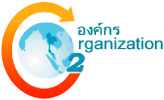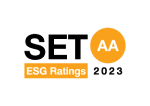| Environmental dimension |
|
Climate change
- Reduce emissions to achieve Net Zero Emissions by 2050.
|
- Reduce GHG intensity by 15% from the base year 2015.
- Renewable capacity raised to at least 30%
|
- Prepared the greenhouse gas inventory for Scope 1, 2 and 3 emissions, encompassing IPPs and SPPs in Thailand under RATCH’s operational control.
- Raised renewable generation capacity to 27.48% of total capacity, exceeding the 25% target.
- Accumulated 11,381.05 tCO2e of carbon credits in 2024.
|
| Social dimension |
|
Community engagement
- Implement CSR projects that create positive impacts on community and society at large and support SDG
|
- Positive impacts of RATCH Group’s CSR projects assessed by SROI method
- Alignment to SDGs
|
- Evaluated the Social Return on Investment (SROI) of the Education for Career Empowerment Project in Lao PDR and the result was 1.36:1 and supported SDG 4: Quality Education.
- Implemented social activities that supported SDGs, which are:
- Goal 3, healthy lives and well-being via mobile clinic covering Ratchaburi Power Plant’s neighboring areas in collaboration with Muban Chombueng Rajabhat University's Thai Traditional and Alternative Medicine Office.
- Goal 13, urgent action to combat climate change via Love the Forests and the Community Project and reforestation/forest conservation for carbon credits.
- Goal 14, marine resources via mangrove reforestation for carbon credits in collaboration with the Department of Marine and Coastal Resources.
- Goal 15, terrestrial ecosystem via reforestation for carbon credits in collaboration with the Royal Forest Department, Mae Fah Luang Foundation and the Royal Forest Department’s Community Forest Foundation.
|
|
Human rights
- Implement Human Rights Due Diligence to control and prevent violations
|
- Assess human rights risks and impacts on all stakeholder groups every 3 years.
- Zero violation
|
- Reviewed the Human Rights Policy.
- Communicated and promoted understanding in the Human Rights Policy among the employees of the Group’s 7 business entities in Thailand and Lao PDR.
- Organized training and raised awareness in human rights among the Company’s employees.
- No violation of human rights.
|
| Economic dimension |
|
Supply chain management
- Develop a sustainable supply chain management procedure as a mechanism to control and prevent risks and impacts in the supply chain
|
- 100% ESG risk assessment covering all suppliers
- 100% audit covering all significant suppliers
|
- All relevant job operators of RATCH and the business entities under the Company’s operational control attended a training and comprehended the sustainable procurement principles.
- All 5 risk factors – climate change and greenhouse gas, human rights, labor’s safety and occupational health, anti-corruption and personal data protection/cyber threats – were applied with the supplier screening process.
- The ESG operations of 148 suppliers were assessed.
|
|
Customer relationship
- Create a single process and tools for customer satisfaction evaluation
|
- At least 90% of customer satisfaction score
|
- Monitor the customer satisfaction surveys of all business entities in the Group and disclose the results.
- Communicated and build good relationships with customers via channels and activities on a regular basis; and consistently improved the operations to address customer expectations.
|






